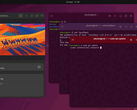Cybersecurity researchers have detailed a critical vulnerability that undermines the security of many encrypted Linux laptops, enabling evil maid attacks. The report from Ernw demonstrates that even when systems are protected with well-known defenses like Secure Boot and a password-protected bootloader, a significant oversight allows for a full system compromise.
The attack vector lies within the Initial RAM Filesystem (initramfs), a temporary system that runs during boot to prepare the main operating system. By intentionally entering the wrong disk decryption password multiple times, an attacker can force the system to drop into a powerful, low-level debug shell.
From this shell, the core of the vulnerability can be exploited. Because the initramfs itself is not cryptographically signed — only the kernel and its modules are — an attacker can unpack it, inject malicious scripts, and repack it without tripping any security warnings. The next time the owner boots the laptop and successfully enters their password, the hidden malware runs with the highest level of privilege, capable of stealing the decryption key, logging keystrokes, or exfiltrating data.
The researchers note that this is less of a bug and more of a design oversight focused on system recoverability rather than physical security. Crucially, this attack vector is often missed by standard hardening guides and security benchmarks.
Fortunately, the mitigation is straightforward. Concerned users and system administrators can modify their system’s kernel parameters to ensure the computer halts or reboots instead of opening a debug shell after failed password attempts. The report serves as a stark reminder that even robust security chains can be broken by a single weak link.






















